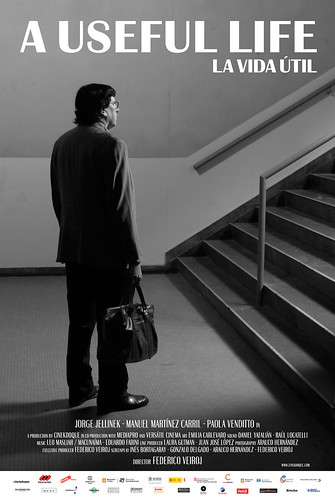SFIFF54 #4: A Useful Life
by Ryland Walker Knight

Federico Veiroj's A Useful Life is a black and white short feature (only 67 minutes) that doesn't need your eyes to be excellent but your eyes could only help its cause since its main point is a flip on the title of Dave Kehr's new book: movies matter. Not only that, our reparatory houses matter no matter what somebody with a microphone* tells you. Matter of fact, this movie's got rather simple aims but it's also got enough love for the movies that any cinephile will likely fall in love with it. The style echoes Bresson's presentational purity (this desk, this bag, this staircase) and the film is full of so many references that they're too many to name here** but the two that matter most are pretty tough to miss.
First, as hinted by a title card up front (the entire credits precede the film), there's a speech culled from Mark Twain about lying and the value of lying in a world of lies delivered by our main man from the cinematheque, Jorge (played by Uruguayan film critic Jorge Jellinek), in a law classroom when he nods, "Yes," to the query, "Are you the substitute teacher?" He finishes his speech (I wish I could quote it or find the passage online) as the real substitute teacher enters the classroom and leaves without confrontation. No one stops him. No one should. Besides, he's not the only one having fun in the scene: the student who asked him to take a role he was not meant for understands his practical joke and she laughs from her front row seat.
The second quote involves our man, alone, on a white staircase, trying out some Fred Astaire moves—up and down and around the steps—making himself smile for a good few minutes in an unbroken shot. It's truly a joyful moment, his movements filling the frame with an energy of something like discovery and everything like pleasure; that is, he's having a ball playing with this world. But it's not cloying because our man is more clumsy than graceful, moving in spurts, his hands still as slack at his sides as when he trudges Montevideo's streets or the hallways of his dying/dead home of cinema. It's not learning how to walk—he does that fine—, it's learning how to make use of what he learned in the dark, which is as good a classroom for life as any other arena. After all, the pick up line that works for Jorge isn't, "Care for a coffee?" Rather, with a bunch of teeth flashing: "Want to see a movie?"
* or an impressive New York apartment, or a lot of cash to withhold, or an institution's denial of said funds to hide behind
** in part because I could not tell you what other movies were mined for a lot of the sweeping score on the soundtrack




No comments:
Post a Comment